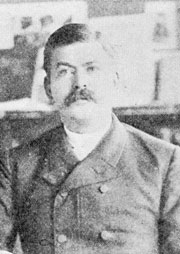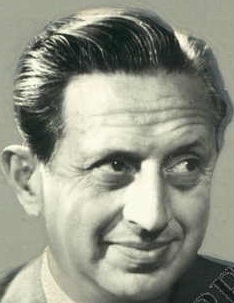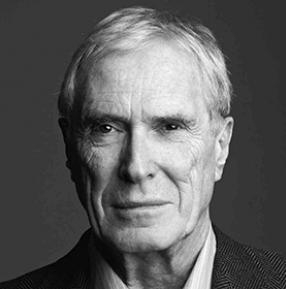April 11
George E. Macdonald

On this date in 1857, freethought editor George Everett Macdonald was born in Maine. He was largely self-educated, working as a youngster on an uncle’s farm in New Hampshire after his parents’ deaths. He joined his brother, Eugene Montague Macdonald, in New York City to work for a printing house. His brother, a foreman for The Truth Seeker, a freethought newspaper founded by D.M. Bennett, later purchased the paper with two others and established The Truth Seeker Co.
MacDonald, who contributed to The Truth Seeker, particularly humor pieces, eventually founded Freethought, a rationalist newspaper out of San Francisco in 1877. In 1907, he took over editorship of The Truth Seeker until 1937. He edited the book, Fifty Years of Freethought, which, in a folksy style, chronicled events in American freethought. Vol. I was published in 1927 and Vol. II, with a foreword by Clarence Darrow, was published in 1931. Darrow called Macdonald “a valiant soldier for human liberty.” (D. 1937)
“The [Catholic] Church being what she is cannot have the instincts of a gentleman.”
— Macdonald, "Fifty Years of Freethought" (1927)
Leo Rosten

On this date in 1908, journalist and political scientist Leo Rosten was born in Łódź, now a part of Poland. He was born into a Yiddish-speaking family and emigrated to the U.S. at age 3, where his trade unionist parents opened a knitting shop in the Chicago area. He grew up in a working-class neighborhood in which the primarily Jewish residents spoke Yiddish and English. From an early age, Rosten had an interest in books and language that led him to write his first story at the age of 9. He put himself through college and received degrees from the University of Chicago and the London School of Economics.
Emerging into the workforce during the Great Depression, Rosten was unable to find a job that fit his degree. Instead he began teaching English to immigrants at night school. This experience led to his most popular work, The Education of H*Y*M*A*N*K*A*P*L*A*N (1937), published under the pseudonym Leonard Q. Ross. In 1949 he joined the staff at Look magazine in New York, where he remained until 1971.
Rosten also lectured at Columbia University, Yale and the New School of Social Research in New York City. He wrote scripts for films such as “The Conspirators” (1944), “The Dark Corner” (1946) and “Double Dynamite” (1951). Rosten is recognized for his humorous encyclopedic collections The Joys of Yiddish (1968) and The Joys of Yinglish (1989). He also edited A Guide to the Religions of America (1955), Religions in America (1963) and A Guide to the Religions of America: Ferment and Faith in an Age of Crisis (1975).
He married Priscilla Ann Mead, a sister of anthropologist Margaret Mead, in 1935. They had two daughters and a son before divorcing in 1959. She took her own life at age 48 later that year. Rosten married Gertrude Zimmerman in 1960. He died at age 88 in New York City. (D. 1997)
“The purpose of life is not to be happy — but to matter, to be productive, to be useful, to have it make some difference that you lived at all.”
— Rosten, "The Myths by Which We Live," The Rotarian, Evanston, Ill. (September 1965)
Mark Strand

On this date in 1934, poet Mark Strand was born on Prince Edward Island, Canada. Strand was raised wary of religion, due to his atheist father who shared with him stories of heretics burned at the stake for their ideas. Strand was encouraged to pursue art by his mother, who was a painter. He attended Antioch College and Yale University, where he studied painting. After years of instruction, he realized that he was following the wrong career path and started studying 19th-century poetry. Soon after he received a master’s from the University of Iowa’s Writers’ Workshop.
Upon graduation, Strand taught at a number of universities, including Yale, Princeton and Harvard. He also held a position as Professor of Social Thought at the University of Chicago until 2005. Strand was the author of more than a dozen poetry books and several works of prose. His writings include “Sleeping With One Eye Open” (1964), “Reasons for Moving” (1968), “Darker” (1970), “The Story of Our Lives” (1973) and “Blizzard of One” (1999), which won a Pulitzer Prize for Poetry.
He died of liposarcoma at age 80 in Brooklyn, N.Y., when his daughter Jessica told The Guardian, “We weren’t religious people, but we worshipped at the foot of culture. He was always an artist.” (D. 2014)
“I haven’t met God and I haven’t been to heaven, so I’m skeptical. Nobody’s come back to me to tell me they’re having a great time in heaven and that they’ve seen God, although there are a lot of people claiming that God is telling them what to do. I have no idea how God talks to them. Maybe they’re getting secret emails.”
— Strand, quoted in his Associated Press obituary (Dec. 1, 2014)
